Translate this page into:
Isolated Asymptomatic Metastasis in the Myocardium: A Rare Scenario in Case of Carcinoma Penis
Address for correspondence: Dr. Santosh Kumar, Department of Urology, Postgraduate Institute of Medical Education and Research (PGIMER), Chandigarh, Haryana and Punjab, India. E-mail: santoshsp1967jaimatadi@yahoo.co.in
-
Received: ,
Accepted: ,
This is an open-access article distributed under the terms of the Creative Commons Attribution License, which permits unrestricted use, distribution, and reproduction in any medium, provided the original author and source are credited.
This article was originally published by Medknow Publications & Media Pvt Ltd and was migrated to Scientific Scholar after the change of Publisher.
Abstract
Penile cancer is a common malignancy in developing countries. It commonly metastasizes to the lymph nodes, lung, liver, and bones. Myocardial metastasis is rare. A 40-year-old male patient presented with ulcerative growth over glans penis. Histologic evaluation of the biopsy sample diagnosed the lesion as squamous cell cancer. Assessment of the stage of the disease revealed cardiac metastasis. Patient received six cycles of chemotherapy. He partially responded, but later succumbed to cardiac failure due to pericardial and pleural effusion.
Keywords
Carcinoma penis
cardiac metastases
chemotherapy
lymph nodes
pericardial effusion
INTRODUCTION

Squamous cell carcinoma (SCC) of the penis is common in Asia and management is technically challenging for the urologist. SCC of the penis most commonly metastasizes to the lymph nodes, lung, liver, and bones. The spread of the tumor to the loco-regional lymph nodes (lymph node positivity) is the most relevant prognostic factor. Myocardial metastases have been reported in autopsy studies.[12]
CASE REPORT
A 40-year-old male presented to our institute with a lesion over the glans penis that had developed over 6 months. Examination revealed a large ulceroproliferative lesion over the glans penis with bilateral fixed and matted inguinal lymph nodes. Wedge biopsy report identified the lesion to be squamous cell cancer of the penis. The patient underwent partial penectomy and fine needle aspiration cytology of bilateral inguinal nodes, both of which revealed moderately differentiated SCC. A contrast-enhanced computed tomography [Figure 1a and b] and 2-deoxy-2-(fluorine-18)fluoro-d-glucose positron emission tomography-computed tomography (18F-FDG PET-CT) [Figure 2a and b] done to evaluate the stage of the disease revealed bilateral inguinopelvic lymphadenopathy and a large right ventricular myocardial metastasis. However, the patient never had any cardiac symptoms or electrocardiographic abnormalities. He received local pelvic radiotherapy and six cycles of systemic chemotherapy with a combination of cisplatin, ifosfamide, and paclitaxel. Follow-up examination and imaging revealed partial response with improvement in the general condition and shrinkage of the inguinal lymph nodes and the cardiac lesion [Figures 3 and 4].
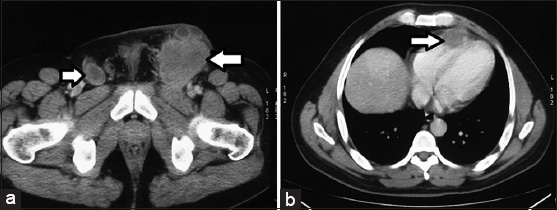
- 40–year-old male presented with a lesion over the glans penis diagnosed as carcinoma penis. Contrast enhanced CT of (a) abdomen axial view reveals bilateral inguinal nodes (arrows) and of (b) chest shows cardiac lesion (arrow) suggestive of metastatic disease.
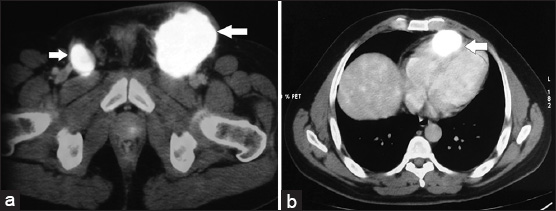
- 40–year-old male presented with a lesion over the glans penis diagnosed as carcinoma penis. PET CT scan of the patient reveals intense FDG uptake lesion in (a) pelvic region by the bilateral inguinal nodes (arrows) and in the (b) chest region by the cardiac lesions (standardised standardized uptake value - 9.8) suggestive of metastatic disease.
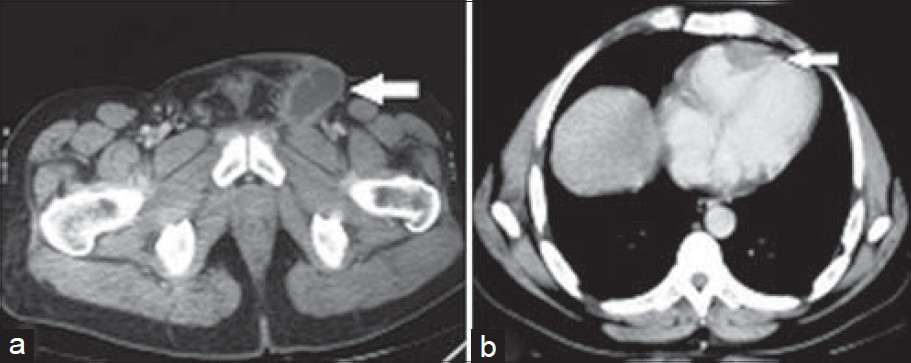
- 40–year-old male presented with a lesion over the glans penis diagnosed as carcinoma penis. After six cycles of chemotherapy contrast enhanced CT of the (a) pelvic region shows partial response in the bilateral inguinal nodes (arrows) and (b) CECT chest shows reduction the cardiac lesion (arrow).
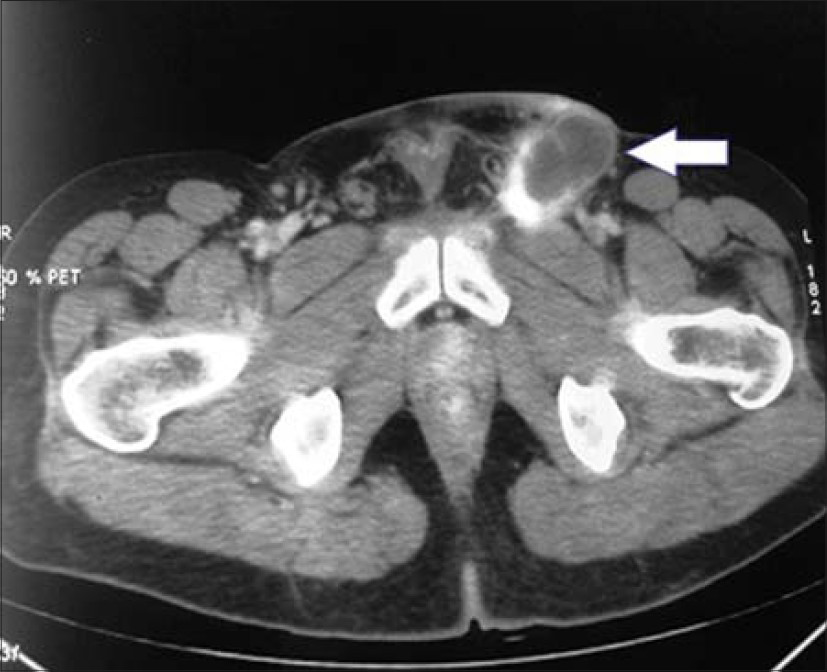
- 40–year-old male presented with a lesion over the glans penis diagnosed as carcinoma penis. Post chemotherapy PET CT scan shows minimal FDG uptake in left inguinal node (arrow) and disappearance of right inguinal nodes suggestive of partial response.
Patient was monitored with regular follow-up during chemotherapy course and was doing well. Subsequently, after 1 month of finishing six cycles of chemotherapy, patient developed abscess in the left inguinal node which was managed initially with antibiotics, but later required incision and drainage. The patient had prolonged hospital course and was discharged under satisfactory condition. Later, 1 month after discharge, the patient presented to the emergency department with dyspnea and chest pain. Investigation revealed massive pericardial effusion. Patient underwent drainage of pericardial effusion and biopsy of the pericardial tissue confirmed metastatic disease [Figure 5]. The patient showed partial improvement, but later succumbed to massive cardiac failure.
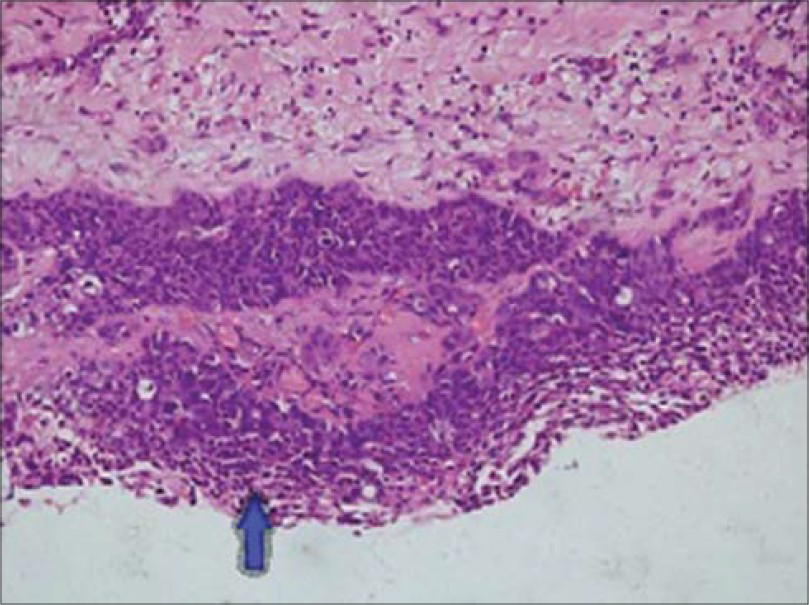
- 40–year-old male presented with a lesion over the glans penis diagnosed as carcinoma penis. Histopathology slide of pericardial tissue stained with hematoxylin and eosin (10× magnification) shows islands and nest of cells surrounded by desmoplastic stroma (arrow) and immunopositivity with PAN – cytokeratin.
DISCUSSION
Squamous cell carcinoma (SCC) of penis is a common genitourinary malignancy in Asia. It commonly presents in the elderly age group. Risk factors include uncircumcised state, smoking, and exposure to human papilloma virus. The usual sites of metastasis include the inguinal and pelvic lymph nodes and the liver, lungs, and bones. Intracardiac metastasis occurs rarely with most of the cases detected on autopsy. Cardiac metastases usually involve the pericardium and less commonly the myocardium.[3] The presentation may be arrhythmias, thromboembolic episodes, or in rare cases cardiac rupture, pericardial tamponade, and even sudden cardiac death. Treatment involves combination chemotherapy, although the effect of the currently available chemotherapy regimens is far from satisfactory.
In our patient, the cardiac lesion was incidentally detected on 18F-FDG PET-CT images and there was a partial response to combination chemotherapy. He remained asymptomatic for the cardiac lesion till the completion of chemotherapy. Our case is unique as it is one of the few cases of cardiac metastasis from a primary penile cancer detected while the patient was alive and where the patient showed a documented partial response to combination chemotherapy.
CONCLUSION
Cardiac metastasis is a rare occurrence in penile cancer and systemic chemotherapy remains the only therapeutic option, albeit with limited efficacy. We report a rare case of cardiac metastasis in carcinoma penis detected as an incidental finding on PET-CT. The need for systemic work-up is essential in patients with bulky nodal disease to rule out distant metastasis, as in our case. The treatment protocol and prognosis change in metastatic disease. FDG PET imaging has a role in staging work-up in patients with carcinoma of the penis. Prompt diagnosis and aggressive treatment are paramount in improving survival and quality of life.
ACKNOWLEDGMENT
The authors thank the patient's family for allowing them to publish the case report and use the images taken during his stay in hospital.
Source of Support: Nil
Conflict of Interest: None declared.
Available FREE in open access from: http://www.clinicalimagingscience.org/text.asp?2015/5/1/15/153971
REFERENCES
- Metastasis of squamous cell carcinoma of the penis into the heart. Arkh Patol. 1998;60:59-61.
- [Google Scholar]
- Metastasis of penile cancer to the heart in a 20-year-oldpatient. Wiad Lek. 1992;45:314-6.
- [Google Scholar]






